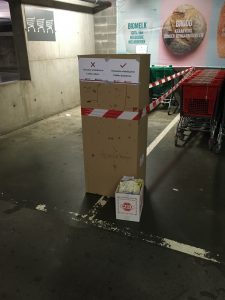Corona, Agriculture and Food Supply
The Coronavirus pandemic affects the life of all us, but it has an especially large effect on the life of people who make it possible for us to stay at home. We all need our daily supply of food, health care and sanitary items, and more. We should be thankful to those who are making this possible.
Not surprisingly, the demand for toilet paper increases if everybody stays at home – we can’t use the office bathroom anymore but have to use the bathroom at home. The same happens to our food consumption – we now have to prepare more food at home than before. Items such as flour, pasta, eggs, different kind of canned and frozen food are in high demand. Not everyone is a chef, but can prepare simple dishes such as fried eggs or spaghetti.
Some of us might be concerned about the supply of food. As many colleagues have pointed out, the supply of food is not something we have to worry about. At least not in the short-run. Supermarket shelves are well stocked. Sometimes, supply of one or the other good might be delayed, but overall the situation looks good and is expected to remain good in the near future.
Restaurants, canteens, and other suppliers of prepared food have mostly closed down and supplies of goods are shifting to the supermarkets. There will be some shortages in seasonal fresh fruits and vegetables. Seasonal workers needed for harvesting are held back by border controls. But this will hardly cause a wider food crisis. We can survive without asparagus and strawberries, but life of course would be better with than without.
Nevertheless, those farmers specialized in seasonal products, including those producing cut flowers and ornamental plants, will be affected economically. Also the seasonal workers and their families will suffer.
What I am even more concerned about is the ability of households to purchase goods. The purchasing power of many households has been reduced substantially due to temporary unemployment. The number of unemployed increased by about 10 million over the past two weeks in the United States. More than 450000 firms have applied for Kurzarbeit by the end of March in Germany. The number of households affected by temporary business close downs is expected to increase substantially in the European Union and elsewhere. Many of those affected are already at the lower end of the income distribution. Furthermore, food distributions via charities have stopped in many countries. Provision of food via schools and kinder gardens is currently unavailable.
Many of those affected are already at the lower end of the income distribution. Furthermore, food distributions via charities have stopped in many countries. Provision of food via schools and kinder gardens is currently unavailable.
Governments need to prepare themselves for providing direct income support or food support for those vulnerable households. The longer the overall shutdown of our economies continues, the larger the problem will be. This needs to be factored into the calculation of the benefits and costs of assessing policies to control the Coronavirus pandemic.


Very important angle- health risks lead to food safety risks- and both farmers and poor consuemrs are heavilty buredened- policy makers must respond
The example of the asparagus harvest is interesting in how entrepreneurs make demand for and supply of workforce meet: workless horeca employees now are replacing the traditional foreign seasonal workers (currently unable to travel to Holland), see for example: https://www.nieuweoogst.nl/nieuws/2020/04/06/aspergetelers-en-horeca-slaan-handen-ineen
Thanks Justus. As you know, one food is designed to increase the immune response of rice consumers in Asia, many of whom are poor. And it’s so close to being registered for use in Philippines, it’s frustrating it can’t help yet. Please refer to http://www.goldenrice.org
Yes indeed, health, health improving nutrition and healthy diets are very important for reducing the impact of the pandemic.